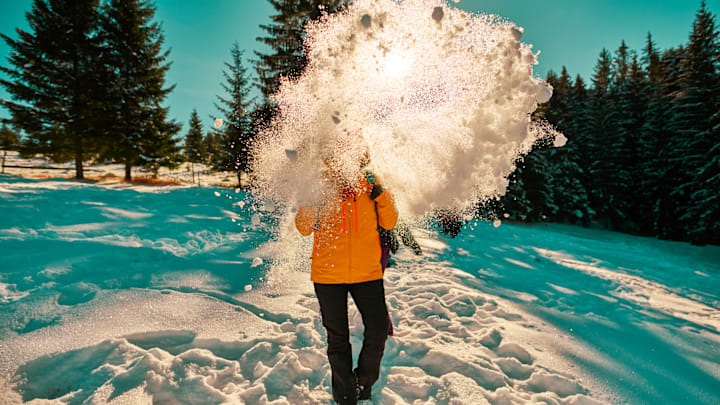Does snow have a scent? The logical side of your brain may say no: Snow is just frozen water, and therefore odorless. But if you’ve ever predicted a big snowstorm based on a familiar tickle in your nose, you know the answer isn’t so straightforward. So what exactly is happening when you “smell” a meteorological event? The answer has less to do with specific odor molecules as it does with the climate in which you smell them.
For an episode of the now-retired podcast Physics Central, olfactory scientist Pamela Dalton laid out the perfect storm of physical conditions you interpret as the smell of snow. When temperatures approach freezing right before it snows, it’s actually harder to detect scents in the air than it is during milder weather. Cold weather slows down molecules in the air, and with less molecular activity, certain smells become less pungent. That means “smelling snow” is, in part, just smelling fewer odors outdoors than what you’re used to.
But if there was nothing else to it, a snowstorm would smell no different than a cold, dry day. The factor that determines the difference is humidity. Right before a snowstorm, the air is more humid than usual. This is what causes the flakes to fall: When the atmosphere hits the maximum amount of moisture it can hold, it reacts by dumping some of the moisture—whether in the form of rain, sleet, or in this case, snow—back onto the ground. That humidity has the added effect of giving your olfactory system a quick boost. To many people, the sensation of being able to smell with a warm, moist nose in freezing weather is linked with the promise of snow.
As all of that’s happening to the world around you, there are mechanisms at work inside your body that also help to explain the unmistakable scent of snow. You sense the cold air you breath with your trigeminal nerve, the same nerve that interprets sensations caused by tingly hot peppers or cool mint toothpaste (it also interprets other facial sensations and is why you might sneeze in sunlight). This is separate from your olfactory system, but you still lump the information it gives you with conventional scents like coffee or pine.
These elements—cold weather, humidity, and a stimulated trigeminal nerve—combine to create something that isn’t an odor, but a sensory experience you’ve come to associate with snow. That’s why, when asked to describe the scent, people often use words like clean, fresh, and cold—things that don’t have much of a scent at all.
Read More Intriguing Facts About Winter Weather:
A version of this story was published in 2017; it has been updated for 2025.
